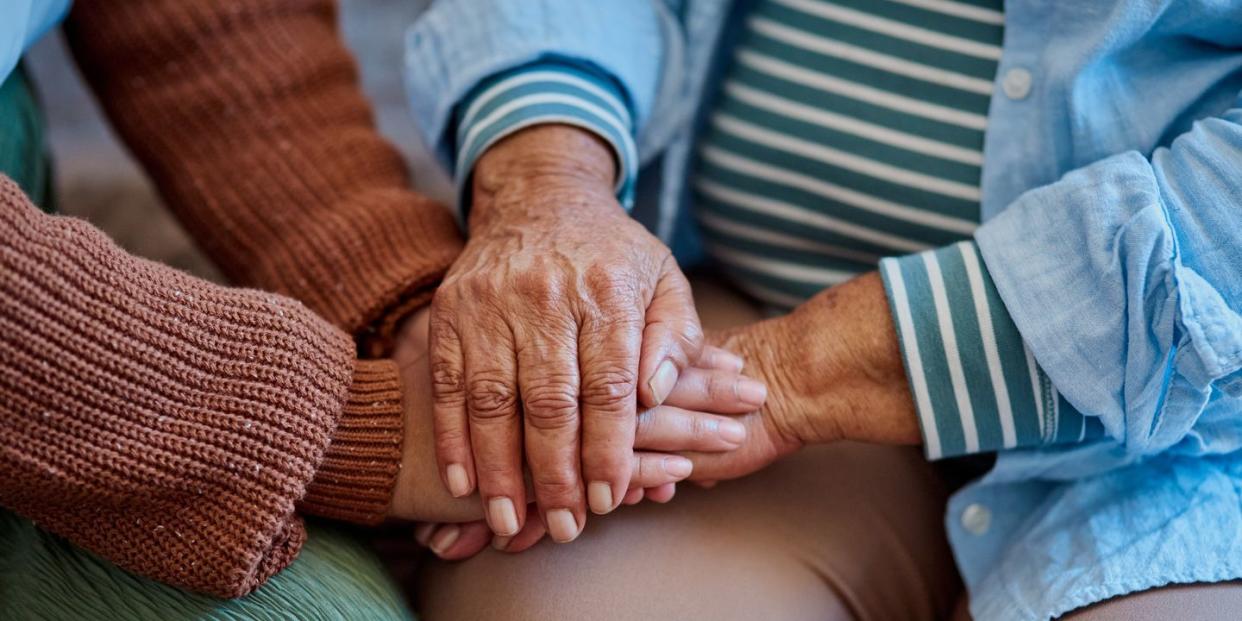Life Expectancy in the U.S. Just Had a Historic Drop

A new federal report on how long people are expected to live in the U.S. has some dismal news: Life expectancy in the U.S. has dropped, just a year after plummeting due to the pandemic.
The report, which was published by the National Center for Health Statistics at the Centers for Disease Control and Prevention (CDC), noted that overall life expectancy in the U.S. is now 76.1 years—the lowest it’s been in the country since 1996. Life expectancy dropped nearly a year between 2020 and 2021, and by more than 2.5 years since the COVID-19 pandemic started.
This marks the biggest two-year decline in life expectancy in a century. Also worth noting: In 2019, life expectancy was 79 years—a full three years more than what it is at this point.
Native Americans and Alaska Natives have been hit the hardest: Their life expectancy is 65, which is similar to what it was for all Americans in 1944.
Life expectancy was highest in Asian women and men, who are expected to live 85.6 and 81.2 years, respectively. And, in general, the report finds that women are expected to live longer than men (79.1 vs. 73.2 years).
The news is a lot to take in. Here’s what’s behind the drop.
Why did life expectancy drop again?
Life expectancy is complicated but, in general, researchers found that COVID-19 was the main factor in the drop. Deaths from the virus led to half of the drop from 2020 to 2021, the report shows.
But that’s not the only thing leading the decline. Drug overdoses led to about 109,000 deaths in 2021—a record high. Deaths from unintentional injuries (which are also linked to drug overdoses) were also a major factor.
“It’s deeply disappointing,” says Scott Kaiser, M.D., a geriatrician and Director of Geriatric Cognitive Health for the Pacific Neuroscience Institute at Providence Saint John’s Health Center in Santa Monica, Calif. “Life expectancy is an important marker of overall population health and we’re typically used to seeing gradual increases in life expectancy year over year.”
While Dr. Kaiser says it’s “no surprise” that there’s been a drop in life expectancy associated with the COVID-19 pandemic, the “sharp and sustained” decrease in life expectancy is “really disappointing and saddening,” he says.
Nancy Nielsen, M.D., Ph.D., senior associate dean for health policy at the University at Buffalo Jacobs School of Medicine and Biomedical Sciences, said that the “magnitude of it does surprise me.” She added, “it certainly highlights the profound effect the coronavirus pandemic has had on our country.”
She notes that drug overdose deaths are a significant factor as well. “We have to recognize that addiction is a medical disease, reduce the barriers to care for the sufferers from substance use disorder, and stop stigmatizing them,” she says.
“This is an indication of a society in decline,” says Perry N. Halkitis, Ph.D., M.P.H., dean of the Rutgers School of Public Health. “We continue to have structural inequalities and social conditions that fuel disease in people. Unless you address those, people will get sick and die.”
Sabrina Barata, M.D., a primary care doctor at Mercy Personal Physicians at Lutherville, points out that the pandemic has impacted the population in more ways than people getting COVID-19. “Most noticeably, it’s impacted the population in terms of depression,” she says. “That can lead to drug overdoses and suicides, which were the top contributors to the decline in life expectancy in addition to COVID.”
How life expectancy is calculated
To calculate life expectancy, the CDC looked at provisional death counts for 2021 from death records received and processed as of April 24, 2022.
That data was then compared with final estimates for 2019 and 2020 to note recent changes.
How to stay healthy right now
Life expectancy is a “reflection of overall population health more than an indicator of any one individual’s health,” Dr. Kaiser says. As a whole, Dr. Nielsen says that “we need to dial down the heated rhetoric on science that so divided us during the pandemic and kept many from seeking the amazing protection afforded by vaccination.”
And, if you put off seeking health care or having your regular well checks during the height of the pandemic, she recommends getting it now. Dr. Barata recommends that you “actually go to the doctor” vs. having a telehealth appointment. “There are a lot of conditions that are better served meeting with your doctor face-to-face,” she says.
And, of course, eating well, exercising regularly, and doing your best to stay on top of your mental health is important as well, Dr. Kaiser says. “All that stuff works,” he adds.
“We need to be individuals who take care of ourselves by healthy lifestyles and avoiding risky behaviors, but we also have to care for one another, recognize the need for human interaction and be willing to stand up against hate and racism,” Dr. Nielsen says. “That will save lives.”
You Might Also Like

